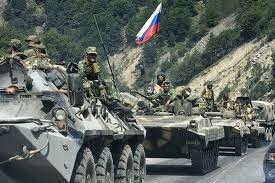It is now official: the International Olympic Committee (I.O.C.) has announced that it does not recognize the independence of two Russian puppet states in the South Caucasus region and that they therefore cannot participate in the 2014 Winter Olympics in Sochi, in the Russian Federation’s North Caucasus region. A few days ago, the I.O.C. made known its decision on the two republics, the Republic of South Ossetia and the Republic of Abkhazia, in a letter to the government of the Republic of Georgia, which claims the two republics as its own territory. But that does not mean that the controversy over the two territories—or related controversies exacerbated by an Olympics right in the Caucasus—are going away.
Abkhazia was an “autonomous republic,” and South Ossetia a lower-grade “autonomous oblast,” within the Georgian Soviet Socialist Republic during the years of Soviet rule. After Georgia and Russia became independent states in 1991, Georgia descended into civil war. In the midst of the fighting, South Ossetia and Abkhazia, with the help of Russian and Chechen mercenaries, ejected ethnic Georgians from their lands and achieved de facto independence—until August 2008, when Georgia’s president, Mikheil Saakashvili, decided to retake South Ossetia once and for all. This prompted a Russian invasion, in the so-called South Ossetia War, or Five-Day War, which ended with a Georgian defeat and Russia’s elevation of both Abkhazia and South Ossetia to the status of fully recognized states. Today, only a handful of nations recognize their sovereignty: Russia, along with two Latin American nations that do so only to piss off the United States—Venezuela and Nicaragua—and two Pacific mini-nations who do so only to secure lucrative aid deals with Moscow. Those two, Tuvalu and Nauru, are also on the slightly longer list of nations that choose to recognize the Republic of China (Taiwan) instead of the People’s Republic of China, and for similar reasons. (Nauru and Tuvalu are the third- and fourth-smallest countries in the world, respectively.) The whole rest of the world considers Abkhazia and South Ossetia part of Georgia.
 |
| Russia invading South Ossetia in 2008 |
 |
| Prime Minister Ivanishvili and President Saakashvili share a tender, candle-lit moment |
 |
| Neither Abkhazia’s flag (with hand) nor South Ossetia’s (the white–red–yellow tricolor at center) will fly at next year’s Winter Olympics. |
But the very location of the winter games remain a festering controversy. Sochi is in the region of Circassia and is the site of one of the worst atrocities in the 19th-century Russian wars to conquer the predominantly-Muslim North Caucasus region. The Ubykh subgroup of the Circassian nationality was dispersed and nearly eradicated; the last speaker of Ubykh died in Turkey in 1992. Circassians, including a very vocal diaspora in Turkey, have agitated harder and harder to have this recognized as a genocide. The Georgian government has already done so. Many Circassians are pushing for their nation to be given a coherent territory as a constituent republic of the Russian Federation, rather than being split among three ethnically-mixed mini-republics, as they are now. (Sochi is not within any of them; it is in Krasnodar Krai, which has an ethnic Russian majority.) Other Circassians seek full independence. And a hardened Islamist terrorist militia called the Caucasus Emirate has established a provisional government for all the northern Caucasus, including ethnic-Russian areas. Emirate fighters have turned places like Dagestan, Kabardino-Balkaria, and Ingushetia into veritable war zones, with car-bombs, ambushes, and assassinations on an almost weekly basis. (While blogging on the London Olympics last year, I listed the Circassian issue as no. 1 among “10 Ethnonationalist Causes That Might Disrupt the [London] Olympics.” Abkhazia and South Ossetia were no. 7.)
 |
| Activists demanding recognition of the Russian Empire’s genocide of Circassians |
 |
| Some nationalist visions of Circassia include Abkhazia; increasingly, many don’t. |
 |
| One map of the imaginary Caucasus Emirate; other versions cover an even larger area. |
 |
| Russia’s president, Vladimir Putin, basked last year in a gold-medal victory by the Team Russia judoku Tagir Khaybulaev, who is a member of the Avar nationality from the Republic of Dagestan. |
[This article was modified on Oct. 4, 2013, to correct an error in which Ivanishvili was erroneously referred to as president instead of prime minister.]



there is very little information on Abkhazia, Nagorno-Karabakh, South Ossetia, et. al. except for the wars of independence and their continuing battle to remain at least nominally free. Sport and especially football is probably important to the people of these countries and could be mentioned somewhere especially now they are safe enough for tourisism
ReplyDelete